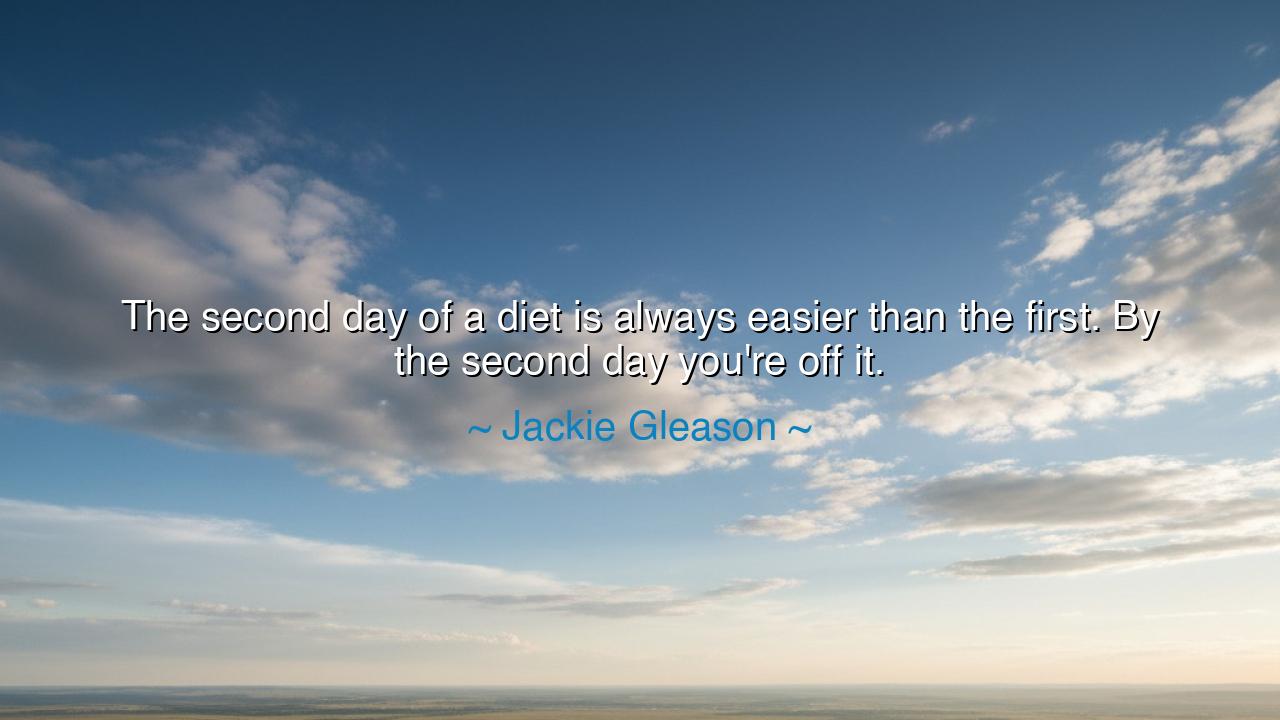
The second day of a diet is always easier than the first. By the
The second day of a diet is always easier than the first. By the second day you're off it.






In the eternal struggle to balance the desires of the body with the needs of the soul, there is a truth that Jackie Gleason humorously highlights with his words: “The second day of a diet is always easier than the first. By the second day you're off it.” This playful yet profound observation speaks to a timeless human experience—the fleeting nature of discipline and the elusive pursuit of self-control. Gleason's words cut to the heart of the challenge we face in our attempts to shape our lives through willpower, and they speak to the inevitable truth that temporary restraint often gives way to indulgence when the initial spark of motivation fades.
The ancient Greeks, ever attuned to the balance between body and soul, recognized that discipline in one’s habits was the key to a virtuous life. Socrates, the great philosopher, often spoke of the importance of mastering one's desires, seeing self-control as the foundation of true wisdom. But Socrates also knew that this path was fraught with difficulty—that the human tendency is to indulge when the pressures of life or the allure of pleasure become too great. Gleason’s words resonate with this ancient truth: while the first day of self-discipline feels like a victory, the second day often reveals the fragility of our resolve. The challenge is not in the first attempt, but in the sustained commitment over time.
In the world of the Romans, the great philosopher Seneca understood the inherent challenges of self-discipline. He wrote extensively about the conflict between reason and desire, urging his fellow Romans to live with moderation and restraint. Yet, even Seneca acknowledged that human nature often led people astray. In his letters, he cautioned against the fleeting moments of willpower that could easily be broken by the weight of temptation. Gleason’s observation about the second day of a diet speaks to this very same dilemma. It is easier to be strong at first, but the true test of strength comes when we must maintain that resolve in the face of our ever-present desires.
The ancient Chinese philosopher Laozi also recognized the tension between discipline and indulgence. In the Tao Te Ching, he speaks of the importance of following the middle way, finding balance in all things. He understood that the key to a life of peace and health was not in rigid control or in giving into indulgence, but in finding harmony between the two. The path of the Taoist was one of gentle discipline, where one could live in accordance with nature and the body’s true needs. Just as Laozi speaks of the need for balance, Gleason humorously exposes the truth that the struggle to maintain balance is often difficult, especially when discipline is easily overcome by the more alluring pull of pleasure.
Consider the example of the great warrior-king, Alexander the Great, who, despite his immense physical and mental discipline, often indulged in the pleasures of the flesh. His love for banquets and wine, for example, is well-documented in history. Alexander’s need to indulge in luxury occasionally betrayed the discipline that had allowed him to conquer the known world. His story serves as a powerful reminder that, even for those with immense strength and willpower, the second day often proves to be a battle. Just as Alexander struggled with indulgence, so too do we struggle with the delicate balance of self-control and indulgence. Gleason’s words remind us that the challenge is not in the initial decision, but in the perseverance required to see it through.
The lesson embedded in Gleason’s quote is a truth about the nature of discipline and human nature: it is easy to make promises to ourselves at first, but maintaining that commitment is where the true challenge lies. Self-discipline is not a one-time act; it is a practice that must be embraced each day. The first day of a diet, or any new endeavor, often carries with it a sense of excitement and determination. But as the days go on, the initial resolve can falter, and we find ourselves surrendering to old habits. This human weakness is not a failure, but a lesson in the need for constant awareness and practice. True strength lies in the ability to persist, to continue despite the inevitable slip-ups and temptations.
So, as you embark on your own journey toward self-mastery, take Gleason’s words to heart. Understand that the path to lasting change is not one of perfection but one of constant effort. It is not about the first day of triumph, but about the second day—and the day after that—when the real work begins. Whether it is in diet, in exercise, or in any other pursuit, the key is to stay present, to acknowledge the temptation to slip, and to rise above it with awareness and determination. The true victory is not in the initial commitment, but in the sustained effort to live with integrity, day in and day out.






AAdministratorAdministrator
Welcome, honored guests. Please leave a comment, we will respond soon